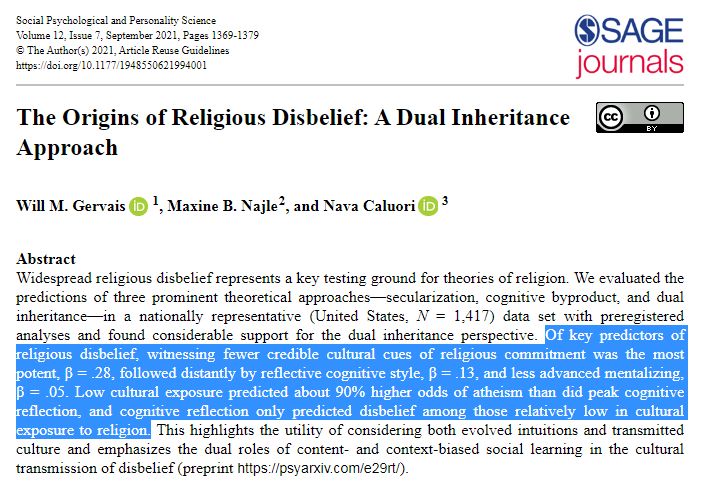
Website: https://shreevallabha.wixsite.com/shree-vallabha

Yesterday, @shreevallabha.bsky.social successfully defended her dissertation; approved with no revisions! 🎉
Dr. Vallabha’s dissertation work is the most comprehensive study of moral humility to date 👀


We find that close and distant future generations get less moral concern than even the most neglected human and non-human groups today. This is noted for boundless and zero-sum moral trade-offs.
🔗https://osf.io/preprints/psyarxiv/c9p8f_v1
#FutureGenerations#MoralPsychology#Psychology
We find that close and distant future generations get less moral concern than even the most neglected human and non-human groups today. This is noted for boundless and zero-sum moral trade-offs.
🔗https://osf.io/preprints/psyarxiv/c9p8f_v1
#FutureGenerations#MoralPsychology#Psychology
worksinprogress.co/issue/fertil...


worksinprogress.co/issue/fertil...
www.researchgate.net/publication/...

www.researchgate.net/publication/...
Our new paper: This seemingly simple question shows something about how people see certain environments as ‘natural’
osf.io/preprints/ps...

Our new paper: This seemingly simple question shows something about how people see certain environments as ‘natural’
osf.io/preprints/ps...
@jaimiekrems.bsky.social
(open access)
doi.org/10.1177/1948...
People who oppose abortion typically suggest that their position is motivated by concern for the unborn. But is there more going on?

@jaimiekrems.bsky.social
(open access)
doi.org/10.1177/1948...
People who oppose abortion typically suggest that their position is motivated by concern for the unborn. But is there more going on?
www.nature.com/articles/s41...

www.nature.com/articles/s41...
#LLMs #NLProc
arxiv.org/abs/2502.11266

#LLMs #NLProc
arxiv.org/abs/2502.11266
Would be great for anyone attending to come see me, alongside some other remarkable researchers!

Would be great for anyone attending to come see me, alongside some other remarkable researchers!
Also, I’m on the market, looking for post-docs - keep me in mind!
Would be great for anyone attending to come see me, alongside some other remarkable researchers!

Also, I’m on the market, looking for post-docs - keep me in mind!
Come see us at the moral psych pre-con poster session @spspnews.bsky.social to learn more😃

Come see us at the moral psych pre-con poster session @spspnews.bsky.social to learn more😃

Come see us at the moral psych pre-con poster session @spspnews.bsky.social to learn more😃
#SPSP2025

#SPSP2025
Congrats Hyewon Yang on her first first-author paper!
doi.org/10.1177/0265...
Congrats Hyewon Yang on her first first-author paper!
doi.org/10.1177/0265...
Who has been on the postdoc and/or job market **this** year and can talk about their experiences and will be at the SRCD conference?
Who has been on the postdoc and/or job market **this** year and can talk about their experiences and will be at the SRCD conference?
With a lovely title that tells us the effect, meaning I don't need to write about their findings here!
(folks, I'm sure that also helps people cite your work!)
journals.sagepub.com/doi/abs/10.1...

With a lovely title that tells us the effect, meaning I don't need to write about their findings here!
(folks, I'm sure that also helps people cite your work!)
journals.sagepub.com/doi/abs/10.1...
1/
Our lab's new paper #SPPS, w/ PhD student Hanna Puffer
Using nationally representative data 2004-2020, asked: generalized prejudice (GP) remained invariant or evolved in US?
Answer: Evolved.
Answer: And it has become more politically affiliated.
#PrejudiceResearch #AcademicSky

1/
Our lab's new paper #SPPS, w/ PhD student Hanna Puffer
Using nationally representative data 2004-2020, asked: generalized prejudice (GP) remained invariant or evolved in US?
Answer: Evolved.
Answer: And it has become more politically affiliated.
#PrejudiceResearch #AcademicSky
www.annualreviews.org/content/jour...
www.annualreviews.org/content/jour...
www.cambridge.org/core/journal...
www.cambridge.org/core/journal...
We show that this test doesn't work in plausible situations. It shouldn't be used.
journals.sagepub.com/doi/10.1177/...


We show that this test doesn't work in plausible situations. It shouldn't be used.
journals.sagepub.com/doi/10.1177/...
journals.sagepub.com/doi/10.1177/...

journals.sagepub.com/doi/10.1177/...
I’m a 5th year doctoral candidate, looking for post-docs. I am primarily an identity researcher, with a focus on how political identity affects misinformation belief, exacerbates polarization, and impacts DEI pushback.
I’m a 5th year doctoral candidate, looking for post-docs. I am primarily an identity researcher, with a focus on how political identity affects misinformation belief, exacerbates polarization, and impacts DEI pushback.

